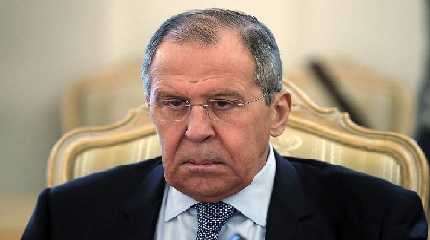
MOSCOW, January 14. /TASS/: A future Russian-Japanese peace treaty must reflect the outlook for cooperation, and not be confined to one phrase about the termination of the state of war, Russian Foreign Minister Sergey Lavrov said on Friday while speaking at a news conference devoted to Russian diplomacy in 2021.
"We are certain that a peace treaty, since it is to be signed not in 1945, but in the 21st century, cannot be confined to just one phrase: ‘The war is over.’ It should demonstrate in reality the diversity of today’s relations and open up new prospects," he said.
Lavrov stressed that Russia was keenly interested to have no misunderstandings in relations with Japan regarding what was happening between the two countries.
"In part, this concerns the artificial obstructions to investment cooperation. We do know that pressures are being exerted on Japan in this respect. Pressures are being exerted to make Japan join the sanctions. It does join some of these, not all but many. Also, pressures concern security issues," Lavrov said.
The Russian foreign minister stressed that the artificial linking of relations with the settlement of peace treaty-related problems did not quite match the interests of Russia and Japan.
"The peace treaty problem is our legacy. President Vladimir Putin has stated this to his Japanese counterparts more than once. We are interested in resolving it… They agreed to step up this work on the basis of the 1956 Declaration, which says that first and foremost a peace treaty is to be concluded before other issues can be considered. We have handed draft articles of such a peace treaty to our Japanese friends," he said.
In November 2018, Putin and the then Japanese Prime Minister Shinzo Abe at a meeting in Singapore agreed to step up peace treaty talks on the basis of the Soviet-Japanese joint declaration of October 19, 1956.
"Moscow finds it worrisome Japan has long become an ally of the United States," Lavrov said. "There is the 1960 treaty, by which the Americans have a great freedom of maneuver and action on the Japanese territory. Now, that the United States in its doctrinal documents has come close to declaring us an enemy, or at least an adversary and the main threat alongside China, Japan’s alliance with a country that regards us as a threat does not quite match the task of creating an optimal climate for our relations," Lavrov said.
He drew attention to the rumors Washington was going to deploy in Japan its ground-launched intermediate and shorter-range missiles, which had been outlawed under the INF Treaty the US preferred to quit.
"There are many things that require fundamental understanding, because if this is really so, then there will emerge threats to Russia," Lavrov explained.
Moscow is determined to conduct a meaningful and open dialogue with Japan, although major disagreements over the international agenda exist between the two countries, he pointed out.
"We’ve got to make up our mind here, too, to what extent we can cope with these still very serious disagreements on the international agenda. We are determined to make our dialogue more specific, concrete and open," he said.
Lavrov underscored the fact that Tokyo’s stance on the platforms of various international organizations was very similar to that of the Western countries and this, too, required greater clarity, if the two countries really wished to share a closer partnership. He voiced the certainty that if Russia and Japan succeeded in their efforts to establish a "partnership of new quality," then the problems in bilateral relations would be far easier to address.
At the same time, he acknowledged that Tokyo remained reluctant to recognize the results of World War II as regards the Kuril Islands and repeatedly resorted to various demarches over Russian military and civilian officials visiting the South Kuril islands.
"This aspect remains a hindrance to us, because Japan is adamant in its refusal to recognize World War II results in this respect," he explained.
Still, Russia hopes that the remaining issues in relations with Japan will not impede further progress in the bilateral dialogue.
"We would prefer to see a situation where these issues and the efforts to settle them should not impede progress there where our interests objectively coincide and where Russia and Japan can pool efforts to enhance their competitive advantages on the world markets," Lavrov said.
He remarked it was noteworthy that Moscow and Tokyo in recent years managed to create a system of relations that allowed for discussing outstanding problems.
"We have a very warm attitude to the Japanese people. They are our neighbors. We share a dramatic common history, but over the past decade we managed to create a climate that enables us to raise in a very friendly way any questions that still remain and require solution," Lavrov said.




